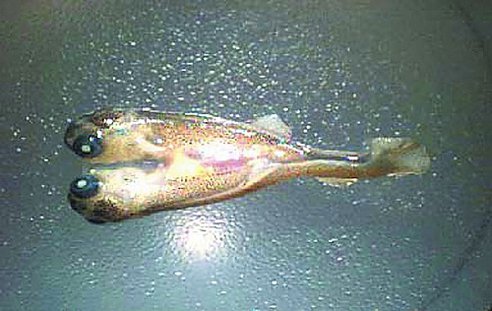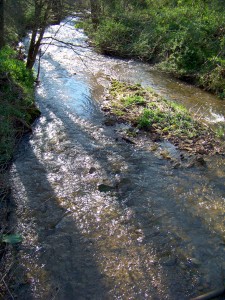Front Porch Blog
Appalachian Voices, Southern Appalachian Mountain Stewards (SAMS) and the Sierra Club recently lodged a settlement addressing several sources of water pollution in Southwest Virginia. As a result, several sources of the toxic pollutant selenium in Wise County, Va., will be cleaned up and the city of Norton, Va., will be one big step closer to cleaning up an abandoned coal-loading facility.
The Case
In 2014, SAMS, the Sierra Club and Appalachian Voices, represented by Appalachian Mountain Advocates, filed a legal action against Penn Virginia for violations of the Clean Water Act. In response to our allegations, Penn Virginia filed claims against A&G Coal Corp., a Jim Justice-owned company, claiming the company was responsible for at least some the pollution. A&G operates a mine neighboring the Penn Virginia land identified in the case.
The violations included unlawful discharge of the toxic pollutant selenium into several tributaries of Callahan Creek. The violations were discovered by SAMS through a review of records submitted by A&G Coal to state regulators in Virginia. The reports showed discharges of selenium and sulfate. Both pollutants are harmful to aquatic life. Selenium can be particularly harmful, resulting in fish deformities and reproductive failure.

A two-headed trout deformed from exposure to selenium
The Settlement
If approved, the settlement will resolve this case and results in several important water quality improvements in Southwest Virginia. Under the settlement terms, A&G Coal will treat three seeps currently discharging selenium into the Kelly Branch tributary of Callahan Creek. The settlement also requires the companies to provide $35,000 for the initial cleanup assessment of a nearby abandoned coal processing site in Norton known as Tipple Hill. Once the site has been restored, it could be included in the Norton Guest River Walk project. The Tipple Hill project is supported by the City of Norton, the Virginia Department of Mines, Minerals and Energy, the Virginia Department of Environmental Quality and the Upper Tennessee River Roundtable.
Moving Forward
This settlement offers our organizations a unique opportunity to resolve pollution from both an active mine and from legacy mining on land owned by a large landholding company. Large swaths of land in Southwest Virginia are owned by companies like Penn Virginia that lease land to timber, coal and gas companies for resource extraction. These landholding companies often escape liability when problems arise from the activities on the land.
Several mechanisms exist for addressing water pollution and other problems associated with coal mining. On active mines, including those undergoing reclamation, the coal company is responsible for monitoring conditions and addressing problems that arise. The state oversees this monitoring to make sure the law is enforced, but a lot of problems still occur.
Problems arising from mines that were closed prior to passage of the Surface Mine Control and Reclamation Act (SMCRA) are eligible for federal Abandoned Mine Land (AML) funding. There is a fairly large amount of money available through the AML reclamation fund, but not enough to cover every problem left over from these pre-SMCRA mines. Mines permitted after the passage of SMCRA include bonds to cover the cost of reclamation should the company fall into bankruptcy. Unfortunately, in many instances, bonding has proved insufficient for proper reclamation, especially as many coal companies go bankrupt in close succession.
In many cases, it is difficult to determine exactly how water pollution arose. Many areas around Central Appalachia have been mined underground, surface mined prior to SMCRA, and surface mined after SMCRA. Add gas well drilling to that mix, and it becomes very difficult to pinpoint the individual companies responsible. Many people, including all of us at Appalachian Voices, primarily want to see water problems cleaned up, regardless of who’s responsible. But with limited resources for cleanup, identifying liability can be a critical part of addressing the sources of water pollution.
Moving forward, we’re going to have to identify multiple resources – funding, expertise, and local knowledge – to help us restore Central Appalachia.
Stay informed by subscribing to the Front Porch Blog.
PREVIOUS
NEXT
Related News

Leave a comment
Your email address will not be published. Required fields are marked *


Erin,
If permissible, tell your followers of the book Gray Mountain, by John Crisham. I just finished it and as with most of his writing, it was a very good read. MTR is an abominable practice! Now, let me say I love the out of doors and nature, but am no so called tree huger either. Global or Climate Change is a potential phenomenon, but many who told us 30 years ago a new little ice age was coming are the same telling me global warming is MY fault. I don’t believe that for a minute. Now, that said, man has done some lousy things to the environment and we in the USA have done more than most to fix things. India and southwest Asia and China are very bad actors and getting them, the largest population spots on earth to get it right for their environment at home is going to be very difficult.
But yes, we need to press on and call them out. The book really hit me on the slurry pond debacles in Appalachia and the tactics the big money of Big Coal uses. No surprise to me. Large sums of money and jobs for those living there always make for a toxic brew. Can coal ever be used in an acceptable “clean fashion…?” We have this and many resources here in North America and if we can great. If not, well then, other sources are out there. We have natural gas in abundance and it burns clean, as far as I know. Our technology in this modern world is requiring more and more energy. We have the smarts to do this wisely. Big Money and Lobbyists who want to keep the status quo will be there to halt smart decisions, and to keep their beds warmly feathered. Just my two cents.